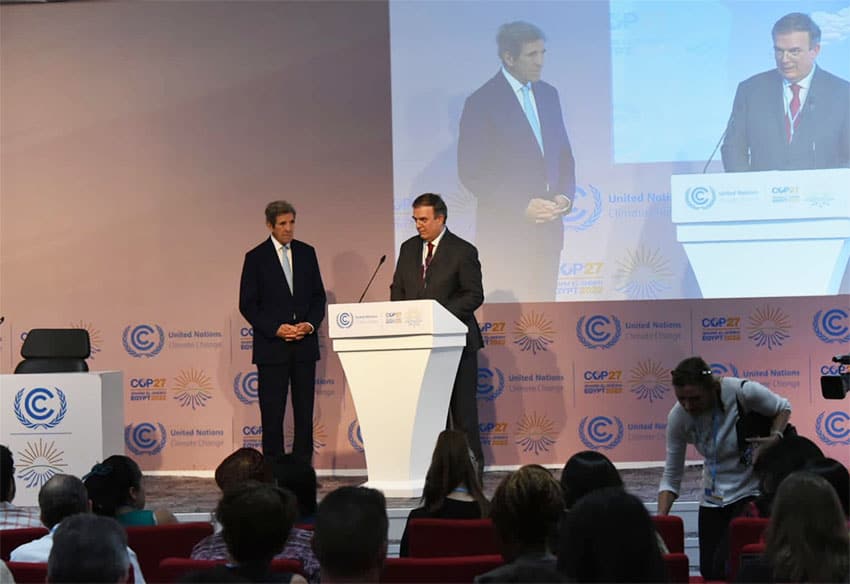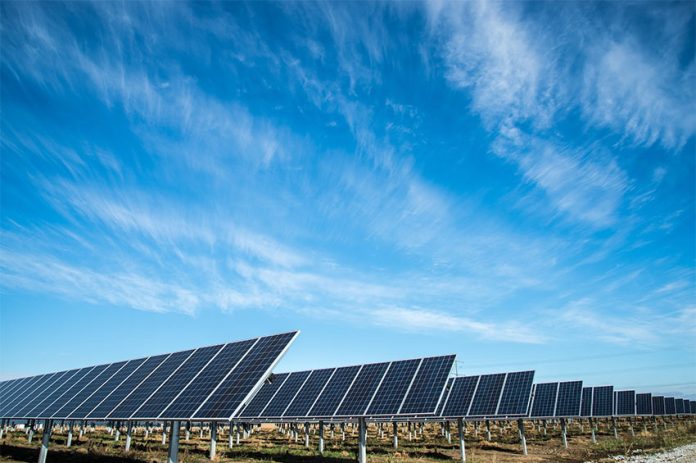Mexico will collaborate with the United States to double its capacity to produce renewable energy, Foreign Affairs Minister Marcelo Ebrard said Saturday at the United Nations Climate Change Conference (COP27) in Egypt.
He also announced that Mexico will aim to reduce its greenhouse gas emissions by 35% by 2030, a target five percentage points higher than expected.
Ebrard made the announcements at a COP27 press conference at which he appeared alongside the United States special presidential envoy for climate, John Kerry.
“President López Obrador has decided to increase the national greenhouse gases emissions reduction target from 22% to 35% in order to accelerate the energy transition in North America,” he said.
“That means doubling efforts in the next eight years compared with the original plans for this decade,” the foreign minister said.
Mexico intends to ramp up production of a range of clean energies including wind, solar, geothermal and hydroelectric.
Ebrard said that an additional US $48 billion in investment in the renewable sector will be needed to double Mexico’s capacity to generate clean energy by the end of the decade. He said that the public and private sectors in both Mexico and the United States will invest in renewables, but didn’t specify how much money would come from each country.
The United States Embassy in Mexico said in a statement Monday that “Secretary Kerry indicated his support for Mexico’s new renewable goal, and the United States intends to work closely with Mexico to achieve these ambitious goals, including through U.S. efforts to mobilize financial support and joint efforts to catalyze and incentivize investments into new Mexican renewable energy deployment and transmission.”

López Obrador said earlier this year that 17 U.S. energy companies had committed to invest in solar and wind projects in Mexico.
Kerry said Saturday that Mexico and the United States have a shared “vision” for a clean energy future in North America. Sonora is set to play a key role in the bilateral plan, with a massive solar farm among the renewable projects slated to commence operations in the northern state in coming years.
Ebrard said last week that Mexico needs to increase renewable energy production “at a rate even faster than the United States” to ensure it can comply with any clean energy requirements the U.S. imposes on exports to that country.
In a separate announcement on Saturday, Pemex said it would collaborate with the United States Environmental Protection Agency (EPA) to reduce its greenhouse gas emissions, especially methane. The state oil company said in a statement that the EPA would provide technical support for the development and implementation of a plan to help reduce its emissions.
“Through the agreement, the EPA will support [Pemex] with economic diagnoses and analyses to support decision-making in its onshore oil and natural gas operations,” it said. The emissions reduction plan is slated to be developed and implemented in the first half of next year.
A team of European scientists published a study earlier this year that concluded that Pemex released some 40,000 tonnes of methane into the atmosphere from a Gulf of Mexico oil and gas platform during a 17-day ultra-emission event last December. The state oil company rejected the study, but the scientists retorted that they definitely didn’t mistake nitrogen for methane, as Pemex claimed.
Methane, the main constituent of natural gas, is much more harmful to the environment than carbon dioxide and is considered a major contributor to global warming.
With reports from El Economista and Reuters
